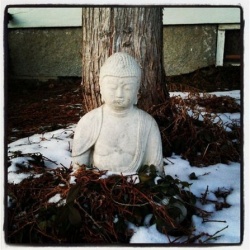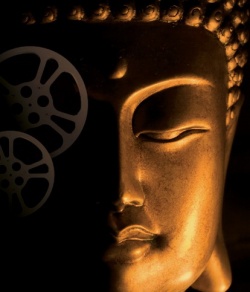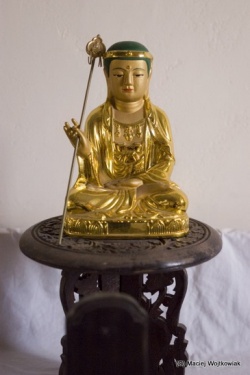Sudden enlightenment
Sudden Enlightenment of Mahāyāna tradition exerts prior nature of enlightenment (bodhi), Buddha-nature (Tathāgata-garbha), Innate Purity or Nirvāṇa and is realized through direct intuition or intuitive leap of discernment of Ultimate Truth (Paramārtha Satya) without gradual empirical development or progressive cultivation through meditation. Intuitive discernment is insight (vipaśyanā) into the true nature of all phenomena (dharmas). In contrast, Gradual Enlightenment of the Theravāda tradition does not exert prior nature of Innate Purity or Nibbāna which is developed empirically through gradual progressive three-fold training of morality (sīla), concentration (samādhi) and wisdom (paññā). Enlightenment is the fruit of non-discriminative knowledge (nirkalpita-jñāna) by which the illusion of the diversifying differentiations are intuitively realized.
For instance, during the Chinese Tang Dynasty, the 6th Chinese Chan Patriarch, Hui-neng (638-713 C.E) founded the Sudden School of Chan Buddhism which paved for the subsequent development of Chan/Zen Buddhism in the modern China, Taiwan, Korea, Japan, Vietnam and in the west today. It was the 28th Indian Dhyāna Master and the first Chan Patriarch in China, Bodhidharma ( 470-543 C.E) who initiated this Sudden Enlightenment method of without relying on the Buddhist scripture, directly pointing into the mind, perceiving the Buddha-nature and obtaining Sudden-enlightenment. The Buddha-nature, an Ultimate Truth, is discerned when the insubstantiality or selflessness of person (pudgala-nairātmya) and that of all phenomena (dharma-nairātmya) are intuited or insightfully perceived. All forms of substantialism (nairātmya) are rejected. The sharpness of Sudden teaching is that the Ultimate Truth (Paramārtha Satya) is perceived directly instead of the conventional gradual method of progressive cultivation. It commences with the knowledge of the Conventional Truth (Saṃvṛti Satya), and graduates gradually into the domain of Ultimate Truth.
The Chan masters point directly at the real moon in the sky (symbolizing the Ultimate Truth) instead of investigating the illusive reflected moon in the water (symbolizing the Conventional Truth) before approaching the real moon in the sky. Gradual Dharma cultivation commences from the reflected moon and consummates at the real moon in the sky. Perception of Buddha-nature is the manifestation of the Buddha-mind. Buddha-mind is the pure consciousness which abides in non-discriminative wisdom (nirvikalpena vihārena). Non-discriminative wisdom is equated with equanimity (upekṣā). It is the liberated consciousness of the Awakened One. Equanimity perfects human character formation.
Let’s examine the early historical fact about the origin of Chinese Chan Buddhism in China in the 6th century C.E in imperial China. Bodhidharma employed the Sudden method to awaken the second Chinese Chan Patriarch, Hui K’o to the experience of Instantaneous Enlightenment. The dialogue of Instantaneous Enlightenment between Bodhidharma and Hui K’o is recorded in the Record of Chan Case History in China known as Pi-yen-lu thus:
Hui K’o: My mind is not appeased.Sir, may you appease my mind?
Bodhidharma: Bring forth your mind. I’ll appease it.
Hui K’o: I’ve sought my mind but it could not be found.
Bodhidharma : Then, I’ve already appeased it.
Immediately, Hui K’o was instantaneously enlightened. This is an ideal example of Sudden teaching to evoke Sudden Enlightenment. Another very celebrated example of Suddenism was the Sudden Awakening of Hui Neng (638-713 C.E) after he had accidentally heard a verse in the Diamond Sūtra when he was selling fire wood in a motel. His master Hong Jen (601-674 C.E) confirmed his enlightenment breakthrough and instructed him on the entire scripture of the Diamond Sūtra. Consequently, he was fully enlightened. The 6th Chan patriarchship was awarded secretly to him immediately. He was advised to leave the temple immediately to prevent others from harming him out of jealousy and dissatisfaction because he was illiterate and only a lay ordinary worker at the horse-yard behind the temple. Hui-neng had no prior practices nor education before his Sudden-awakening to the Saddharma. His sharp karmic root was attributable to his prior practices in the previous lives. Hui-neng expounded the conception of Sudden Enlightenment in his Platform Sūtra of Sixth Patriarch that Sudden Enlightenment breakthrough is preceded by prior gradual, progressive development or cultivation.
Chan Buddhism is a typical example of Sudden teaching to activate Sudden Enlightenment. The Hua-yen Sūtras, The Perfection of Wisdom Sūtras, Diamond Sūtra, Heart Sūtra, and Platform Sūtra of 6th Patriarch are typical good examples of sudden teachings. They are ideal for those who have undergone prior practices or those who have acquired sharp karmic roots from previous lives.
According to Śākyamuni Buddha, Sudden Enlightenment cannot arise without prior gradual development or cultivation. Development (bhāvanā) must precede enlightenment breakthrough. Gradual practices are just preparations for Sudden Enlightenment. Whoever is suddenly enlightened in the present life must have undergone gradual training or prior practices in the previous life. In this sense, the Sudden teachings of Mahāyāna tradition do not conflict with the Theravāda tradition. Those have been instantaneously enlightened is considered to have employed the dry method (vipassanāyāna) without prior practices of meditation, that is without prior development of jhānas (mental concentration or absorptions ). Those, who are gradually enlightened are said to have utilized the wet method (samathayāna) characterized by prior development of jhānas. The distinction between the dry vehicle and the wet vehicle is expounded in the Pāli Nikāyas of the Theravāda tradition. The Sudden method is expounded in the Yuganaddha Sutta (AN.4.170) as the 4th pathway to obtain Nibbāna. The first three pathways are gradual methods of enlightenment. Sudden method permits the enlightenment breakthrough through the sudden arising of Perfection of Wisdom (prajñā-pāramitā) without prior development of mental absorptions (Jhānas).
Sudden enlightenment is non-sectarian. The experience of gnosis can be found in Hindu, Christian, Islamic and many other religious traditions. God-realization or Gnosis is a form of Sudden Enlightenment experience in which the ego is annihilated through wisdom developed or the illusion of the multiplicity of the empirical world is penetrated or intuited into. The ultimate Truth is realized all at once and the False Self is replaced by the True Self or the consciousness is absolutely purified with the annihilation of the egoistic or selfish self which exists illusively.
The common principle to attain self-enlightenment or gnosis is that the illusive selfish self or lower self, which leads to the fallibility of human species, must be eliminated by dispelling ignorance (avidyā) which obstructs wisdom (prajñā).


